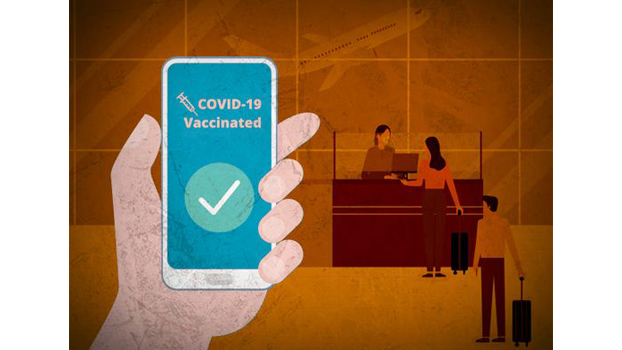Covid passports will be a fact of life in Britain
Pandemic is creating a class divide between the jabbed, the negative and the rest

Colin the Barber’s phone automatically clicks over to voicemail with a brief if not curt invitation to leave a message but if you want to book an appointment for a haircut, he’s not taking bookings and only regular customers will be accommodated until the end of April.
I took the guard off my beard trimmer instead and tried to shear the longest and most wayward wisps — I am not a regular customer of Colin the Barber and I can’t wait until May for an appointment.
By all accounts Colin is not alone. Come Monday, hairdressing shops up and down England will be open for business, the first time this year paying customers can have the privilege of having their locks lopped by professionals. And yes, there are a lot of people here who are sporting lockdown locks at the moment.
Earlier this week, British Prime Minister Boris Johnson offered Britons a first detailed look of how life will begin to return to normal. And on the way to getting haircuts next week, customers can also pick up the first of two free weekly near-instant Covid tests to be offered to everyone living in England from now on — if all goes to plan.
A brand new social experiment
We are about to embark on a brand new social experiment where your test status or vaccine-status will be your passport to meet others in any significant numbers. According to the government, Covid vaccine passports are to be trialled for use at a comedy festival — somehow, that does indeed seem quite apt — in Liverpool, and at selected cultural and sporting events in the coming weeks.
Soon, if the plan is adapted for widespread use in the coming months, there might very well be a danger that you cannot sit indoors in a restaurant unless you’re carrying proof that you’ve been jabbed with at least one dose of three vaccines approved for use in the United Kingdom, have Covid antibodies in your system, or have tested negative using one of those two weekly instant spit and sample test kits.
This brave new world of post-pandemic Britain may indeed impose new class divisions based solely on vaccine status or negativity — a form of pharmaceutical apartheid that imposes social sanctions on those who are unwilling or unable to have the vaccines. And naturally, the idea of such a plan is causing deep divisions across British society.
Johnson was at pains to point out that shops or pubs would not be allowed to ask for proof of vaccine or Covid status before service, but somehow that seems rather hollow.
For business owners who have lost a great deal already during a year of mostly-shut trading conditions, preparing to open up from next Monday means having to invest in social-distancing and improved public hygiene measures to ensure they are operating in a safe coronavirus-free environment.
Protecting businesses
And given the cost of bringing in these measures, many business owners are asking why they shouldn’t be allowed to protect their business by checking first to see if people entering their premises are fit to do so.
Then there are libertarians who argue that any testing is an infringement on personal freedoms, and people should not be discriminated against by being refused a burger or a sandwich because they are unwilling or unable to be vaccinated. Surely there would be a legal jeopardy if a business owner were to refuse service based on vaccination status — particularly if a patron had a pre-existing medical condition that precluded them from being vaccinated?
No doubt there are legal experts who are looking at such potential litigation situations and relish the opportunity to seek remedies in courtrooms up and down England.
The issue of Covid passports is already being advanced when it comes to allowing Britons to travel on summer holidays. Right now, all but essential business travel in limited circumstances is permitted, with no change in British government policy expected until May 17 at the earliest.
Even now, UK officials have floated once more the notion of travel based on a traffic-light system: travel to countries on a green list would be permitted as long as you provide vaccination proof and a negative test; those on an orange list would require quarantine at home — a period that could be curtailed when two negative tests are confirmed; and those on a red list would bring the full bell-and-whistle strict hotel quarantine experience.
High rate of vaccination
Countries on the green list would likely include the UAE which has a high rate of vaccination.
Britain is one of the few countries in Europe that don’t require people to carry national identity cards or other forms of personal identification. The notion of such measures are genuinely considered to be un-British, who balk at being asked for identification as is common practice elsewhere.
The Emirates ID card, for example, has been in place for a little over a decade now and is part and parcel of most transactions at banks or similar places of business or officialdom. Across Europe, national identity cards are a fact of life; not so in Britain, where the notion of identity papers were anathema.
Come next week, when we all can have two free Covid tests weekly and those who are vaccinated carry a stamped business card showing the type and batch number of dose delivered on a specific date, maybe the advent of Covid passports by stealth are the price to pay for normality in this new “normal” — whether we like it or not.
Mick O’Reilly is a Foreign Correspondent at Gulf News. Source: Gulf News



